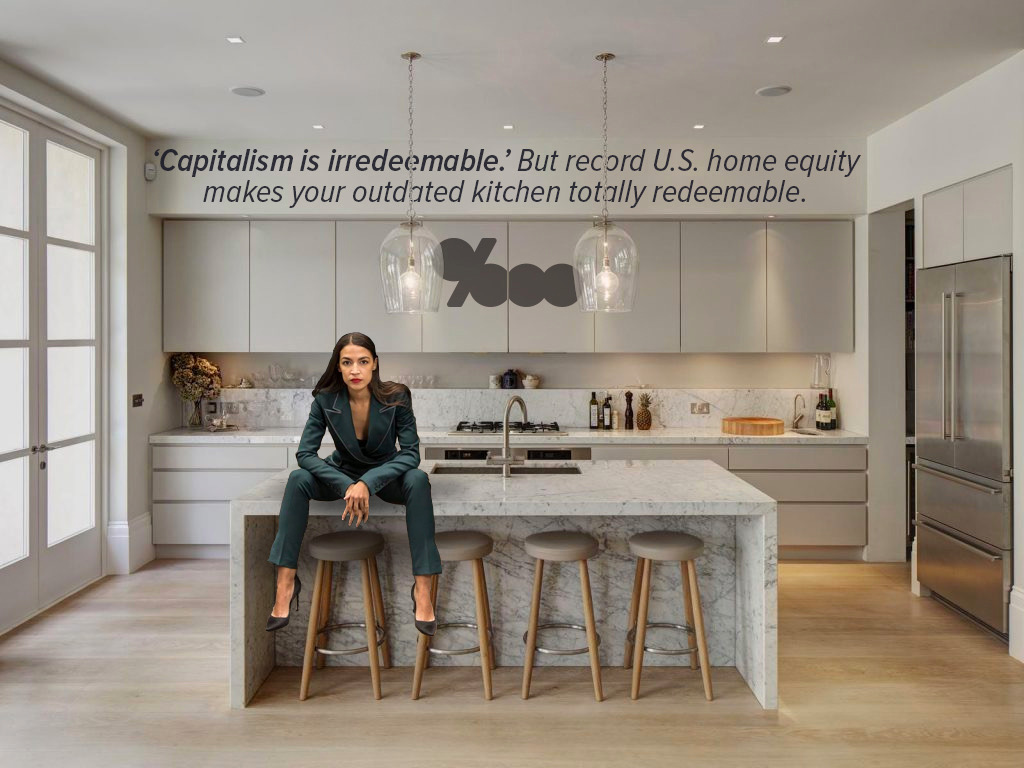What’s more redeemable, capitalism or your outdated kitchen?


Political chatter this past week suggests “capitalism is irredeemable,” but most of us don’t spend our time wondering if society’s political philosophy is totally outdated—we just want to make a bit more money at work and make things a bit better at home.
Ironically for politicians, the system counts on you putting money into the place you call home. Turns out that kitchen you think is totally outdated is in fact tied to the bigger picture, and the $400+ billion remodeling industry is counting on you!
It also turns out a lot of you are sitting on a goldmine to redo that kitchen. American homeowners are sitting on almost $6 trillion (with a T!) in tappable home equity right now.
+++
Equity is the amount of your home’s value that isn’t financed by a loan. So if your home is worth $400,000 and your loan balance is $320,000, you have 20% equity and the loan is the other 80% of the value. “Tappable” equity is defined as homes that have at least 20% or more equity in them.
Knowing this, there are two current sets of stats I’ve been watching.
One, by property data collector BuildFax, says homeowners spent a lot less on remodeling last month compared to the same time last year. People who get paid to have opinions about the economy look closely at remodeling spending to tell them how well the economy is doing, so less spending is bad.
Another, by the National Association of Home Builders, says people are going to spend more and more on remodeling in the next two years. That’s good!
So are we spending less or more on remodeling? Who’s right? Who can I believe?!
Actually, both reports can be right. They’re just missing the extra context of where that remodeling money will come from.
Redoing that kitchen is expensive, so you might have to finance it. Almost one-third of homeowners are putting renovations on credit cards, which is just a terrible idea.
The better financial plan is to use that equity to open a home equity line of credit (HELOC).
HELOC rates are about three times cheaper than a credit card, and if you use HELOC funds for home improvement, the loan interest you pay can be tax deductible, so it ends up being a way cheaper method of paying for home improvements.
In theory, this treasure trove of home equity could fuel a huge boom in remodeling. And now it may become reality now that technology is finally helping make HELOCs as easy as a credit card.
+++
Then the politicians may start shouting that people with equity are playing a rich-get-richer game.
But this isn’t about politics. This is just normal market cycle stuff. Home equity went down the tubes 11 years ago as home prices collapsed, but the folks who bought homes when they were cheaper in the years leading up to now have benefitted from the recovery.
That’s who I’m talking to. And I’m not looking for votes. I’m just sharing some personal finance 101 concepts.
If you have equity, plan to stay in your home, and want to improve it, a HELOC will pencil better than most other options.
So we’re not here to debate political philosophy, and I joke above about the home remodeling industry counting on you. It’s not about what they want. It’s about what you want given where you might be in the current economic cycle.
And if you’ve been a homeowner for at least a few years now, you probably have some equity—which can come in handy if you want to make things a bit better at home.
That’s why we care about hammering these seemingly minor economic data points. Check out the Reference section below for some more reads on home equity and how you can tap into it.
___
Reference:
– Home equity loans are cheaper than credit cards, end of story
– People Have More Home Equity Than Ever Going Into 2019
– The Basis Point Teams Up With Black Knight & Blend To Break Home Equity Roadblock
– Key Economic Indicators Suggest Unease Among Homebuyers (BuildFax)
– Residential Remodeling Spending Continues to Gradually Grow (NAHB)
